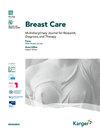医生对乳腺癌临床试验主要终点相关证据的认知
IF 2
4区 医学
Q2 OBSTETRICS & GYNECOLOGY
引用次数: 0
摘要
目的:探讨医生对乳腺癌临床试验证据的认知。方法:由中国乳房外科学会进行调查。我们通过在线问卷调查了医生对有意义的终点、适当的随访时间和临床可接受的获益的看法。结果:278份有效问卷中,大部分问题答案不一致。对于局部治疗,30.6%、28.8%和28.4%的参与者分别认为局部复发(LRR)、无病生存(DFS)和总生存(OS)是最有意义的终点,47.5%的参与者认为5年随访可以改变临床实践,34.5%的参与者认为5年随访应该是10年。在辅助组中,分别有45.7%、38.5%和12.9%的人认为DFS、OS和LRR是最有意义的终点,52.5%的人认为10年随访是可靠的,37.4%的人认为5年随访是足够的。在晚期患者中,分别有49.6%、24.1%和23.7%的人认为无进展生存期、生活质量和OS是最有意义的终点,分别有39.6%和28.8%的人认为1年和3年的随访是有意义的。同样,临床可接受的绝对差异也不一致。结论:虽然OS是乳腺癌研究中最可靠的终点,但大多数中国肿瘤学家主张在某些情况下可以使用替代终点。医生对随访时间和获益程度的看法差异很大,这反映了一个事实,即在支持使用新的癌症治疗方法方面有许多未解决的问题;需要达成共识,例如一个非常一致的替代终点和一个有意义的足够大的治疗益处。本文章由计算机程序翻译,如有差异,请以英文原文为准。
Physicians’ Perception of the Evidence in Relation to Primary Endpoints of Clinical Trials on Breast Cancer
Objective: To investigate physicians’ perception of the evidence of clinical trials on breast cancer. Methods: A survey was conducted by the Chinese Society of Breast Surgeons. We investigated the physicians’ perception of meaningful endpoints, appropriate follow-up duration, and clinically acceptable benefit through online questionnaires. Results: Among 278 validated questionnaires, the majority of the questions had no consistent answer. For local treatment, 30.6, 28.8, and 28.4% of participants regarded locoregional recurrence (LRR), disease-free survival (DFS), and overall survival (OS) as the most meaningful endpoint, respectively, 47.5% believed that 5-year follow-up can alter clinical practice, and 34.5% thought it should be >10 years. In the adjuvant setting, 45.7, 38.5, and 12.9% regarded DFS, OS, and LRR as the most meaningful endpoint, respectively, 52.5% thought that 10-year follow-up was solid, while 37.4% thought that 5-year follow-up was enough. In the advanced setting, 49.6, 24.1, and 23.7% considered progression-free survival, quality of life, and OS the most meaningful endpoint, respectively, and 39.6 and 28.8% considered that a follow-up of 1 year and 3 years, respectively, was meaningful. Similarly, the clinically acceptable absolute difference was inconsistent. Conclusion: Most Chinese oncologists advocated that surrogate endpoints could be used in certain circumstances, though OS was the most reliable one in breast cancer studies. Doctors’ perceptions of follow-up time and magnitude of benefit vary widely, reflecting the fact that there are many unanswered questions about supporting the use of new cancer treatments; a common understanding needs to be reached, such as a very consensual surrogate endpoint and a meaningful sufficiently large therapeutic benefit.
求助全文
通过发布文献求助,成功后即可免费获取论文全文。
去求助
来源期刊

Breast Care
医学-妇产科学
CiteScore
4.40
自引率
4.80%
发文量
45
审稿时长
6-12 weeks
期刊介绍:
''Breast Care'' is a peer-reviewed scientific journal that covers all aspects of breast biology. Due to its interdisciplinary perspective, it encompasses articles on basic research, prevention, diagnosis, and treatment of malignant diseases of the breast. In addition to presenting current developments in clinical research, the scope of clinical practice is broadened by including articles on relevant legal, financial and economic issues.
 求助内容:
求助内容: 应助结果提醒方式:
应助结果提醒方式:


